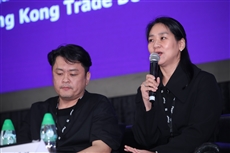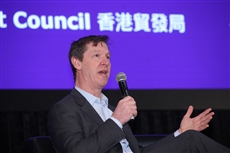Fine Period and Action Films Appeal to Audiences
21 March 2018 – The 22nd Hong Kong International Film & TV Market (FILMART), organised by the Hong Kong Trade Development Council (HKTDC), is being held until Thursday (22 March) at the Hong Kong Convention and Exhibition Centre. At two “Filmmaker Spotlight” seminars, Kang Hye-jung, producer of Korean blockbuster film The Battleship Island, and David Kosse, Executive Producer of Oscar-winning films The Theory of Everything and Room, President, STXinternational, STX Entertainment shared their experiences and journeys in film production, as well as insights on developments in the local and international film markets.
Producing a high-quality Korean film
At the first “Filmmaker Spotlight” seminar, Ms Kang, also CEO of Filmmakers R&K, said an excellent film that can capture the hearts of the audience will both win critical acclaim and fare well at the box office.
The Battleship Island took seven years to prepare and six months to make. Its production cost, a 22 billion Korean won (approximately HK$160 million), is the highest in South Korea’s filmmaking history. Ms Kang emphasised that the film not only tells the story of a historical event and its victims, but also pays tribute to the Koreans who have overcome adversity and persevered.
Moderator Patrick Suen, a film critic and writer, said The Battleship Island was set in Korea during the World War Two, when the country was invaded by Japan. Some Koreans are taken to the Battleship Island to work as miners, while women are made comfort women.Ms Kang pointed out that the record-breaking production cost was in part due to the construction of a realistic set, and the goal to “produce a high-quality Korean movie.”
Ms Kang noted that many films have been inspired by events in contemporary Korean history, but The Battleship Island was not meant to tell a historical story. “We just wanted to show how the Korean people were forced to work as miners.” She explained that the depiction of Koreans who torture their own countrymen is an honest reflection of history. “The movie shows two types of Koreans – those who save their own people and those who work for the Japanese. Not all Koreans are good people, nor are all Japanese bad. In the real world, there is not only black and white. The good and evil can coexist. That’s human nature.” She said that the film is not only about history or the past, but it is also about the world today. “There are many places in the world today, such as in Africa, where people are suffering, oppressed and exploited, where they are struggling to survive."
When asked about the challenges of making the film, Ms Kang said many of the major actors had to lose weight to present an accurate portrayal and to fit into the small shooting area. Those were also reasons why they chose actors of smaller build for other roles. She was especially thankful to stars such as So Ji-sub, Hwang Jung-min and Song Joong-ki, who immediately accepted the roles after reading the scripts, and went on diet.
A serious production with no expenses spared
Ms Kang considered the explosion scenes the most remarkable of all in the film. She explained that they did not want to use too many post-production special effects, so they shot some of the scenes at a spot close to a residential area in Korea. “Since South Koreans are often worried about terrorist attacks by North Korea, we had to warn the residents there before shooting.” However, after spending 100 million won and a night of shooting, director Ryoo Seung Wan was not happy with the outcome and re-shooting had to be done.
In another scene, Song Joong-ki flees the island with 200 people. “Those were not background actors but regular ones. They rehearsed the scene many times and completed the shooting smoothly.” Ms Kang said that it was almost impossible to leave the island at the time of the event, and that she wanted to show the hope for freedom in the movie.
Asked if she had any plans to collaborate with other filmmakers in Asia, Mr Kang said she had talked with producers from Vietnam, Malaysia and Indonesia. She said she appreciated the works of various Chinese directors including Johnnie To, Peter Chan and Feng Xiaogang, and that she looked forward to working with them.
Two key elements for a successful film
At the second “Filmmaker Spotlight” seminar at FILMART, David Kosse, President of STXinternational, STX Entertainment who was involved in the production of Room, pointed out that before the film was released, nobody could have predicted its box office performance.
However, he believed that there are two crucial elements in a successful film: actors and the script. He said actors are more important, although it is also crucial for a story to impress and resonate with the audience. He explained that a film is about a certain culture that is shared by the audience. It is not so much about ethnicity as it is about the taste of the audience.
He believed that it takes more than superhero or franchised film to groom a new generation of movie stars. Actors in Marvel’s or James Bond superhero movies are not very successful in other movies, probably because they do not connect with the audience in non-superhero roles, Mr Kosse said. Some Hollywood stars such as Tom Cruise or Tom Hanks have shown evolution in their choice of roles. That was how they built the connection with the audience and how they remained superstars until this day, said Mr Kosse.
Arab markets waiting to be developed
Mr Kosse identified the Arab world as the next big market. He noted that the market has a population of 30 to 40 million people, with few cinemas available.” He said that filmmakers are constantly exploring new audiences. With the help of modern technology, films can be released and distributed through digital channels in addition to being shown in cinemas. The film market is no longer dominated by big stars or large-scale productions, and medium-sized productions can also find room for development. Social media platforms also help to promote new films at lower cost, said Mr Kosse.
FILMART website: http://m.hktdc.com/fair/hkfilmart-en
Entertainment Expo website: http://www.eexpohk.com
|
|
Kang Hye-jung, producer of Korean blockbuster film The Battleship Island (right), says that the film is not only about history or the past, but it is also about the world today |
|
|
David Kosse, President of STXinternational, STX Entertainment says it is crucial for a story to impress and resonate with the audience |
Media enquiries
Please contact the HKTDC's Communications and Public Affairs Department:
Banbi Chen Tel: (852) 2584 4525 Email: banbi.yc.chen@hktdc.org
Sunny Ng Tel: (852) 2584 4357 Email: sunny.sl.ng@hktdc.org
To view press releases in Chinese, please visit http://mediaroom.hktdc.com/tc
About the HKTDC
Established in 1966, the Hong Kong Trade Development Council (HKTDC) is a statutory body dedicated to creating opportunities for Hong Kong’s businesses. With more than 40 offices globally, including 13 on the Chinese mainland, the HKTDC promotes Hong Kong as a platform for doing business with China, Asia and the world. With 50 years of experience, the HKTDC organises international exhibitions, conferences and business missions to provide companies, particularly SMEs, with business opportunities on the mainland and in international markets, while providing information via trade publications, research reports and digital channels including the media room. For more information, please visit: www.hktdc.com/aboutus.



